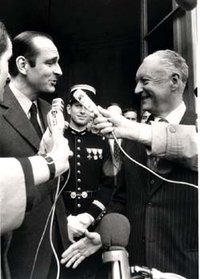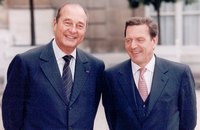
flowered-garden-normandy-32.jpg
About France Category: History
- Profile
Jacques René Chirac (born November 29, 1932) is a French politician. He was elected President of the French Republic in 1995 and 2002 (in addition, inherently, being Co-Prince of Andorra).Jacques Chirac President of France
An only child, Chirac is the son of a bank clerk and later an executive for an aircraft company.In 1954, he graduated from the Institut d’Études Politiques de Paris, a university for students interested in politics and diplomacy and earned a degree in political science. In 1956, Chirac was drafted in the army.
He obtained the rank of officer during the French-Algerian war and was wounded in Algeria, where France was engaged in a colonial war.
Currently married to Bernadette Chodron de Courcel, they have two daughters, one of whom has long been his public relation assistant (Claude Chirac). He is a Roman Catholic.
Early political career
Inspired by General Charles de Gaulle to enter public life, Chirac continued pursuing civil service in the 1950s. He attended Harvard University’s summer School before entering the École Nationale d’Administration (the elite, competitive-entrance college that trains France’s top civil servants) in 1957. He earned a graduate degree from the École Nationale d’Administration and in 1959.
He then became a civil servant and rose rapidly through the ranks. In April 1962, only three years after having graduated from the École Nationale d’Administration, Chirac was appointed head of the personal staff of Georges Pompidou, then prime minister under de Gaulle. This appointment launched Chirac’s political career.
Pompidou considered Chirac his protégé and referred to him as “my bulldozer” for his skill at getting things done. The nickname “Le Bulldozer” caught on in French political circles. Chirac still maintains this reputation. “Chirac cuts through the crap and comes straight to the point. … It’s refreshing, although you have to put your seat belt on when you work with him,” said an anonymous British diplomat in 1995.
At Pompidou’s suggestion, Chirac ran as a Gaullist for a seat in the National Assembly in 1967. Chirac won the election and was given a post in the ministry of social affairs. (Gaullists have historically supported a strong central government and independence in foreign policy.) Although more of a “Pompidolian” than a “Gaullist,” Chirac was well situated in de Gaulle’s entourage, being related by marriage to the general’s sole companion at the time of the June 1940 Appel.
Chirac already rose to become economy minister in the late 1960s, serving as department head and a secretary of state. As state secretary at the Ministry of Economy and Finance (1968-71), he had worked closely with Giscard d’Estaing, who had then headed the ministry. In 1968, when student and worker strikes rocked France, Chirac played a central role in negotiating a truce.
Chirac’s first high-level post came in 1972 when he became minister of agriculture and rural development under his mentor Georges Pompidou, who was elected president in 1969. He quickly earned a reputation as a champion of French farmers’ interests. As minister of agriculture, Chirac first attracted international attention when he assailed U.S., West German, and European Commission agricultural policies that conflicted with French interests.
In 1974 Chirac was appointed minister of the interior. As minister of the interior from March 1974 he was entrusted by President Pompidou with preparations for the presidential election then scheduled for 1976. However, these elections were brought forward by Pompidou’s sudden death on April 2. In 1974 former minister of economy and finance Valéry Giscard d’Estaing, a non-Gaullist centrist, was elected Pompidou’s successor amid France’s most competitive election campaign in years.
Prime minister, 1974-76
On May 29, 1974 Chirac (left) replaced Pierre Messmer (right) as prime minister on the steps of the Hôtel Matignon.When Giscard became president, Chirac was nominated as prime minister by Giscard on May 27, 1974. At the age of just 41, Chirac stood out as the very model of the jeunes loups (“young wolves”) of French political life.On May 29, 1974 Chirac (left) replaced Pierre Messmer (right) as prime minister on the steps of the Hôtel Matignon.
However, the government could not afford to ignore the narrow margin by which Giscard d’Estaing had defeated the United
Left candidate, François Mitterrand in 1974. Giscard, not himself a member of the Gaullist Union des Démocrates pour la République (UDR), saw in the essentially pragmatic Chirac the qualities needed to reconcile the “Giscardian” and “non-Giscardian” factions of the parliamentary majority. As premier, Chirac quickly set about persuading the Gaullists that, despite the social reforms proposed by President Giscard, the basic tenets of Gaullism, such as national and European independence, would be retained.
Citing Giscard’s unwillingness to give him authority, Chirac resigned as prime ministers in 1976. He proceeded to build up his political base among France’s several conservative parties. His goal was to reconstitute the Gaullist UDR into a neo-Gaullist group, the Rally for the Republic.
Mayor of Paris
By an astute move he secured his election as secretary-general of the Gaullist UDR in the face of potential opposition from the party “barons” and soon afterwards consolidated his hold over the majority by easily defeating an opposition motion of censure. Chirac also formed the conservative Rally of the Republic movement in 1976 to perpetuate the policies of Charles de Gaulle.
With the new party firmly under his control, Chirac was elected mayor of Paris in 1977, a position he held until 1995. As mayor of Paris, Chirac’s political influence grew. As mayor, he provided for programs to help the elderly, people with disabilities, and single mothers, while providing incentives for businesses to stay in Paris.
In 1978, he attacked pro-European Valéry Giscard d’Estaing’s Union for French Democracy as being the “pro-foreign party” (in the “call of Cochin”).
In 1981 Chirac made his first run for president. Chirac ran against sitting president Giscard, thus splitting the center-right vote; both Chirac and Giscard were defeated by Socialist François Mitterrand. When a strong conservative coalition won a slight majority in the National Assembly in 1986, Mitterrand appointed Chirac prime minister. This power-sharing arrangement, known as cohabitation, gave Chirac the lead in domestic affairs.
Chirac sought the presidency and ran against Mitterrand for a second time in 1988, but was defeated in runoff elections. However, he remained mayor of Paris and active in parliament.
Chirac has been named in several cases of alleged corruption and abuse which occurred during his office term as mayor, some of which have already led to felony convictions. However a controversial judicial decision from 1999 grants him virtual immunity, as current president of France. He has refused to testify on these matters, arguing that this would be incompatible with his presidential functions. See Corruption scandals in the Paris region.
Presidency
The Grand-Croix of the Legion of Honor is conferred on Chirac during his inauguration as President of the French Republic on May 17, 1995.His 18 years as mayor of Paris finally proved the launching pad for his first successful bid for his first successful bid for the French presidency. On his third attempt to win the French presidency, Mayor Jacques Chirac of Paris finally succeeded in May 1995, narrowly beating Socialist Party challenger Lionel Jospin.
Shortly after taking office, Chirac—undaunted by international protests by angry environmental groups—insisted upon the resumption of nuclear tests at Mururoa Atoll in French Polynesia in 1995. Reacting to criticism, Chirac said, “You only have to look back at 1935. … There were people then who were against France arming itself, and look what happened.”
Chirac announced on February 1, 1996 that France had ended “once and for all” its nuclear testing, intending to accede to the Comprehensive Test Ban Treaty.
Chirac was elected on a platform of tax cuts and job programs, but his policies did little to ease the recent labor strikes during his first months in office. On the domestic front, neoliberal economic austerity measures introduced by Chirac and his conservative prime minister Alain Juppé, including budgetary cutbacks, proved highly unpopular. At the year’s end Chirac faced major workers’ strikes.
One of his nicknames is Chameleon Bonaparte. Another is La Girouette (“the weathervane”). At one point an anti-European Gaullist, he became a champion of the euro as president.Jacques Chirac with German Chancellor Gerhard Schröder.
In September 1998 Chirac first met with German Chancellor Gerhard Schröder. Trying to firm up his party’s government coalition, in 1997
Chirac dissolved parliament for early legislative
elections in a gamble designed to bolster support for his conservative economic program.But this strategy backfired. Chirac’s dismissal of the parliament created an uproar, and his power was weakened by the subsequent backlash. The Socialist Party, joined by other parties on the left, soundly defeated Chirac’s conservative allies, forcing Chirac into a new period of cohabitation with Jospin as prime minister. This power-sharing arrangement between Chirac and Jospin lasted five years.
Cohabitation significantly weakened the power of Chirac’s presidency. The French president only controls foreign and military policy—and even then, allocation of funding is under the significant influence of the prime minister. Short of dissolving parliament and calling for new elections, the president was left with little power to influence public policy regarding crime, the economy, and public services.
He has generally stood for lower tax rates, the removal of price controls, strong punishments for crime and terrorism and business privatization. However, he also, at other times, argued for more “social” economic policies and was elected in 1995 after a campaign where he said he would reduce the “social rift” (fracture sociale).
On July 14, 2002 during Bastille Day celebrations, Chirac survived an assassination attempt by a lone gunman with a rifle hidden in a guitar case. The would-be assassin fired a shot towards the presidential motorcade, before being overpowered by bystanders. The gunman, Maxime Brunerie, was later found unfit to stand trial due to mental incapacity; the violent far-right group with which he was associated, Unité Radicale was then administratively dissolved. Brunerie had also been candidate for the Mouvement National Républicain party at a local elections.
Second term as president
President Chirac and United States President George W. Bush talk over issues during the G-8 sessions, July 21, 2001.At age 69, Chirac faced his fourth presidential campaign in 2002. He was the first choice of fewer than one voter in five in the first-round of voting in April 2002. In the election of 2002 he opposed controversial rightwing extremist Jean-Marie Le Pen of the anti-immigrant National Front and won re-election by a landslide. (Le Pen had shocked the world when he edged past Prime Minister Jospin in the first round of presidential balloting to qualify for the runoff election.)
“We must reject extremism in the name of the honor of France, in the name of the unity of our own nation,” Chirac said before the presidential election. “I call on all French to massively vote for republican ideals against the extreme right.”
Chirac emerged as a leading voice against the Bush administration’s conduct in the Middle East. Despite intense U.S. pressure, Chirac threatened to veto any resolution in the U.N. Security Council that would authorize the use of force to disarm Iraq until UN weapons inspectors in Iraq were given more time. (cf. Governments’ pre-war positions on invasion of Iraq, Global protests against war on Iraq).
- Photos

 .In 1954, he graduated from the Institut d’Études Politiques de Paris, a university for students interested in politics and diplomacy and earned a degree in political science. In 1956, Chirac was drafted in the army.
.In 1954, he graduated from the Institut d’Études Politiques de Paris, a university for students interested in politics and diplomacy and earned a degree in political science. In 1956, Chirac was drafted in the army.
 Left candidate, François Mitterrand in 1974. Giscard, not himself a member of the Gaullist Union des Démocrates pour la République (UDR), saw in the essentially pragmatic Chirac the qualities needed to reconcile the “Giscardian” and “non-Giscardian” factions of the parliamentary majority. As premier, Chirac quickly set about persuading the Gaullists that, despite the social reforms proposed by President Giscard, the basic tenets of Gaullism, such as national and European independence, would be retained.
Left candidate, François Mitterrand in 1974. Giscard, not himself a member of the Gaullist Union des Démocrates pour la République (UDR), saw in the essentially pragmatic Chirac the qualities needed to reconcile the “Giscardian” and “non-Giscardian” factions of the parliamentary majority. As premier, Chirac quickly set about persuading the Gaullists that, despite the social reforms proposed by President Giscard, the basic tenets of Gaullism, such as national and European independence, would be retained. Chirac dissolved parliament for early legislative
Chirac dissolved parliament for early legislative